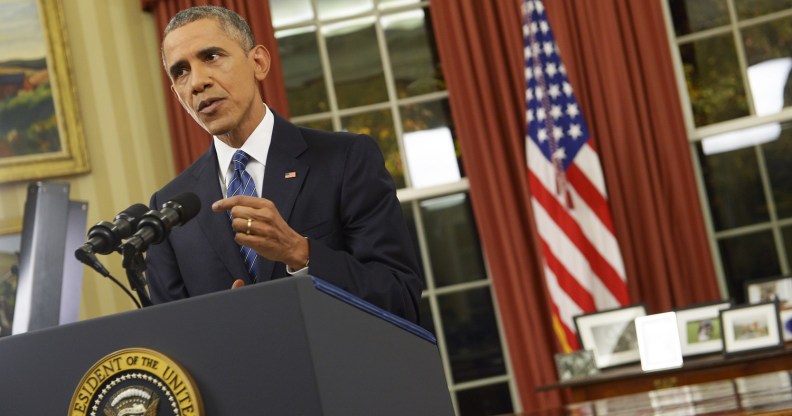Obama invites equal marriage pioneer and Syrian refugee to State of the Union

Among guests of Michelle Obama for the President’s final State of the Union address will include a same-sex marriage pioneer and a Syrian refugee.
Jim Obergefell, who brought a case which eventually led to same-sex marriage becoming legal across the US, will be among the guests at Obama’s address on Tuesday.
His lawsuit went all the way to the US Supreme Court after Ohio refused to recognise his marriage, performed in Maryland.
He will also be joined as the guest of the First Lady by Refaai Hamo, who lost seven members of his family during an airstrike.
After fleeing to Turkey, Hamo eventually got refugee status to move to Michigan.

Jim Obergefell outside the Supreme Court
President Obama in 2015 marked the end of an exceptional 12 months for global LGBT awareness by becoming the first president to explicitly use the term in the State of the Union address.
Towards the end of his speech last year, while discussing human rights, Mr Obama said: ”That’s why we defend free speech, and advocate for political prisoners, and condemn the persecution of women, or religious minorities, or people who are lesbian, gay, bisexual, or transgender. We do these things not only because they are the right things to do, but because ultimately they will make us safer.”
While former US President Bill Clinton was the first to mention gay people in a State of the Union address, Mr Obama became the first to use the words ‘lesbian’, ‘bisexual’ and ‘transgender’. The latter is probably the most significant, with the awareness of transgender issues raised significantly during 2014 in the US and across the world.
Mr Obama also praised the rapid progress on same-sex marriage across the United States over the previous year. He said: “I still believe that we are one people. I still believe that together, we can do great things, even when the odds are long. I believe this because over and over in my six years in office,
“I have seen America at its best…I’ve seen something like gay marriage go from a wedge issue used to drive us apart to a story of freedom across our country, a civil right now legal in states that seven in ten Americans call home.”

